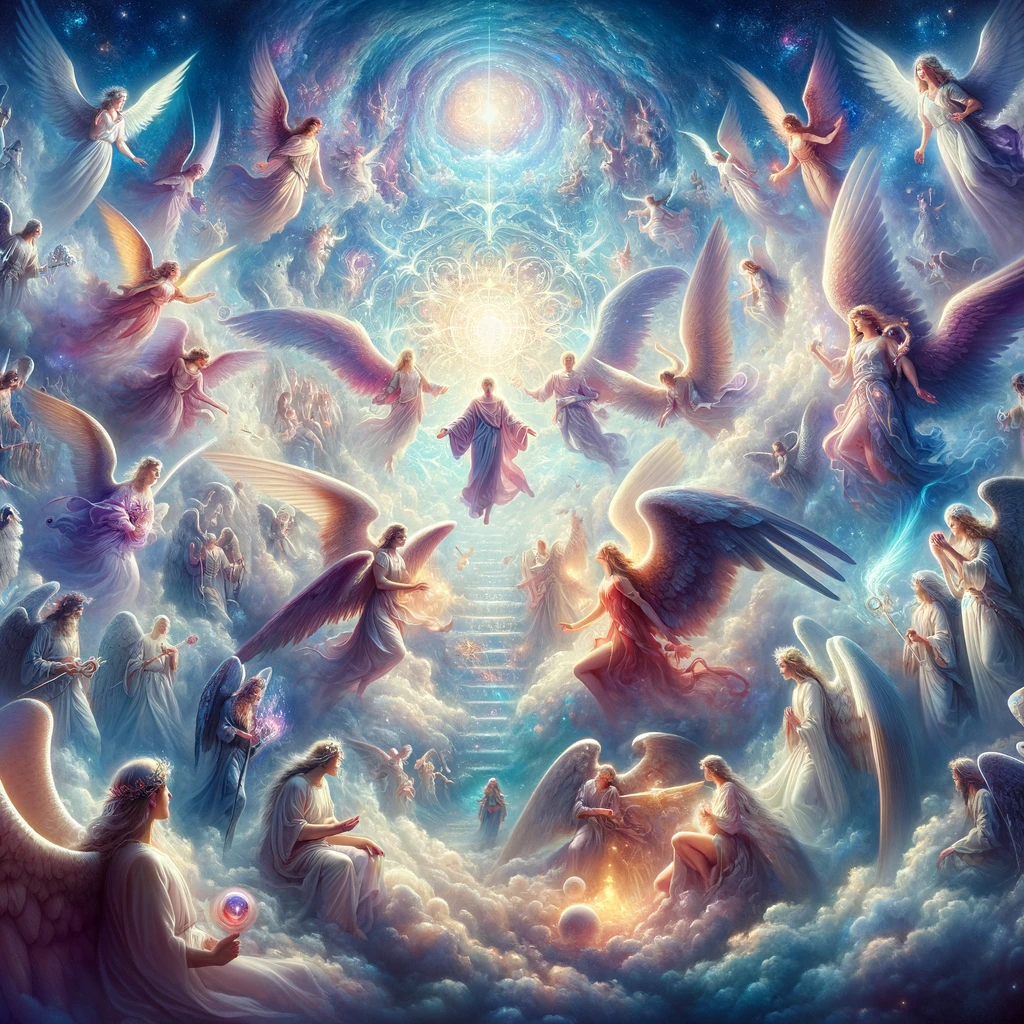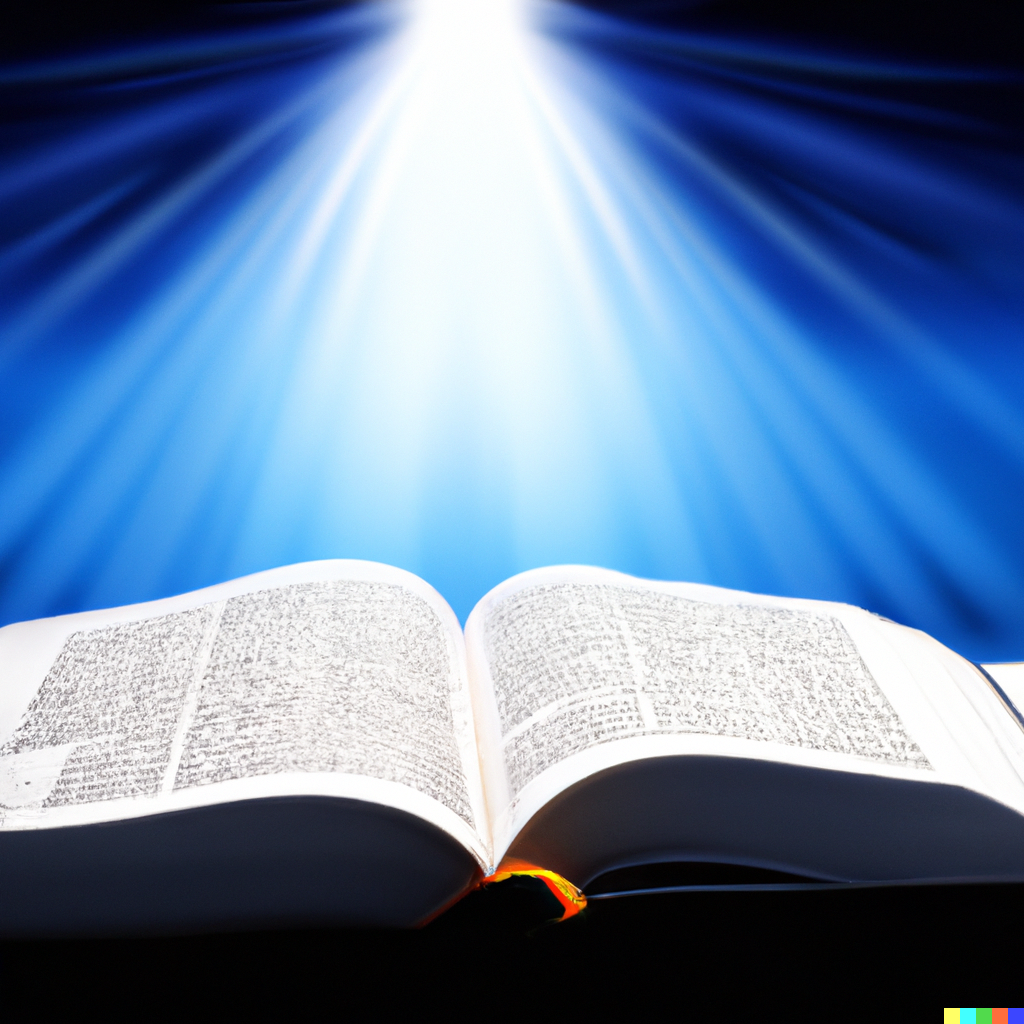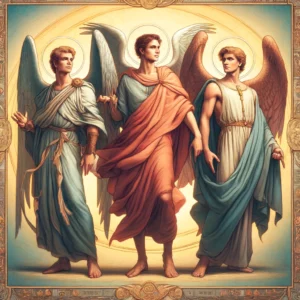
Angelology
Step into the enchanting world of Eastern Orthodox theology, where angelology takes center stage.... View more
Archangels
-
Archangels
Archangels: Michael, Gabriel, and Raphael Serve as God’s primary messengers to humans, involved in key biblical narratives, known figures include Michael, Gabriel, and Raphael.
“Arch-anʹgel [chief angel]. The word occurs in the New Testament but twice (1 Thess. 4:16; Jude 9). It is supposed to denote those angels who occupy the highest rank in the celestial order or hierarchy. Of these there are said to be seven who stand immediately before the throne of God (Rev. 8:2), who have authority over other angels, and are the patrons of particular nations (Rev. 12:7; Dan. 10:13). The names of two only are found in Scripture—Michael, the patron of the Jewish nation (Dan. 10:13, 21; 12:1; Jude 9; Rev. 12:7), and Gabriel (Dan. 8:16; 9:21; Luke 1:19, 26).” (1)
“according to some, means an angel occupying the eighth rank in the celestial order or hierarchy; but others reckon it a title only applicable to our Saviour; Jude 9; Dan. 12:1; 1 Thess. 4:16. On this point Bishop Horsley has the following observations:—“It has been for a long time a fashion in the church to speak very frequently and familiarly of archangels as beings of an order with which we are perfectly well acquainted. Some say there are seven of them. Upon what solid ground that assertion stands, I know not; but this I know, the word ‘archangel’ is not to be found in any one passage of the Old Testament: in the New Testament it occurs twice, and only twice. One of the two passages is in the First Epistle to the Thessalonians; where the Apostle, among the circumstances of the pomp of our Lord’s descent from heaven to the final judgment, mentions ‘the voice of the archangel;’ the other passage is in the Epistle of St. Jude, where the title of archangel is coupled with the name of ‘Michael the archangel.’ This passage is so remarkably obscure that I shall not attempt to draw any conclusion from it but this, which manifestly follows, be the particular sense of the passage what it may: since this is one of the two texts in which alone the word ‘archangel’ is found in the whole Bible; since in this one text only the title of archangel is coupled with any name; and since the name with which it is here coupled is Michael; it follows undeniably that the archangel Michael is the only archangel of whom we know any thing from holy writ. It cannot be proved from holy writ, and, if not from holy writ, it cannot be proved at all, that any archangel exists but the one archangel Michael, and this one archangel Michael is unquestionably the Michael of the book of Daniel.” (2)
“1 Enoch 9 has a list of four archangels: Michael, Sariel (uncertain; Greek: Uriel; many Eth mss Suryal), Raphael and Gabriel. Usually Uriel (in the Book of Parables in 1 Enoch 37–71 Phanuel) figures in the lists of four archangels instead of Sariel (e.g. Sib. Or. 2:215; Apoc. Mos. 40:2; Pirke de-Rabbi Eliezer 4), but Sariel belongs to the oldest tradition of the four archangels according to Black 1985:129, 162–163, referring to the Aramaic fragments and to 1QM 9:14–16 (cf. Davidson 1992:50, 325–326). The name of Uriel is replaced by that of Phanuel in 1 Enoch 40:9; 54:6 and 71:8–9. The group of four archangels probably developed from the four living creatures from Ezek 1. They are standing on the four sides of the divine throne (cf. the ‘Angels of Presence’, e.g. 1QH 6:12–13; 1QSb 4:25–26; 4Q400 col. 1 lines 4 and 8) and say praises before the Lord of Glory (1 Enoch 40), pray on behalf of the righteous on earth (1 Enoch 40:6; Tob 12:15) and act as intercessors for the souls of righteous ones who have died (1 Enoch 9; T. Abr. 14). They play an important part at the final judgement. Thus they lead among other things the souls of men to the tribunal of the Lord (Sib. Or. 2:214–219) and will cast kings and potentates in the burning furnace on the great day of judgement (1 Enoch 54:6; on the groups of archangels and their functions see further Michl 1962:77–78, 89–91, 169–174, 182–186). Sometimes, archangels are mentioned who do not belong to one of the lists of four or seven of the principal angels (e.g. →Jeremiel, 4 Ezra 4:36; Dokiel, T. Abr. 13:10 rec. long.). Phanael acts as angelic messenger during Baruch’s heavenly journey and is described as archangel and interpretor of revelations (3 Apoc. Bar. 10:1; 11:7). In 1 Enoch 87–88 three archangels put →Enoch in positions to observe carefully what is being revealed to him. Philo identifies the archangelos with the divine →Logos (Decharneux 1989).” (3)“Tradition says that it was Raphael who appeared to the shepherds by night, announcing our Blessed Lord’s nativity. Uriel appeared to Esdras to interpret God’s will to him (2 Esdras 4). It was Chamuel who wrestled with Jacob. Tradition also says it was he who appeared to our Lord in the garden of Gethsemane. Jophiel was guardian of the tree of knowledge of good and evil, and drove out Adam and Eve from Paradise. It was Zadkiel who stayed the hand of Abraham” (4)Sources:(1) Shepherd, Thomas J. The Westminster Bible Dictionary 1880: 52–53. Print.
(2) Watson, Richard. “Archangel.” A Biblical and Theological Dictionary 1851: 81–82. Print.(3) Van Henten, J. W. “Archangel.” Ed. Karel van der Toorn, Bob Becking, and Pieter W. van der Horst. Dictionary of deities and demons in the Bible 1999: 81–82. Print.(4) M’Clintock, John, and James Strong. “Archangels.” Cyclopædia of Biblical, Theological, and Ecclesiastical Literature, Supplement—A–Z 1894: 204. Print
Log in to reply.


